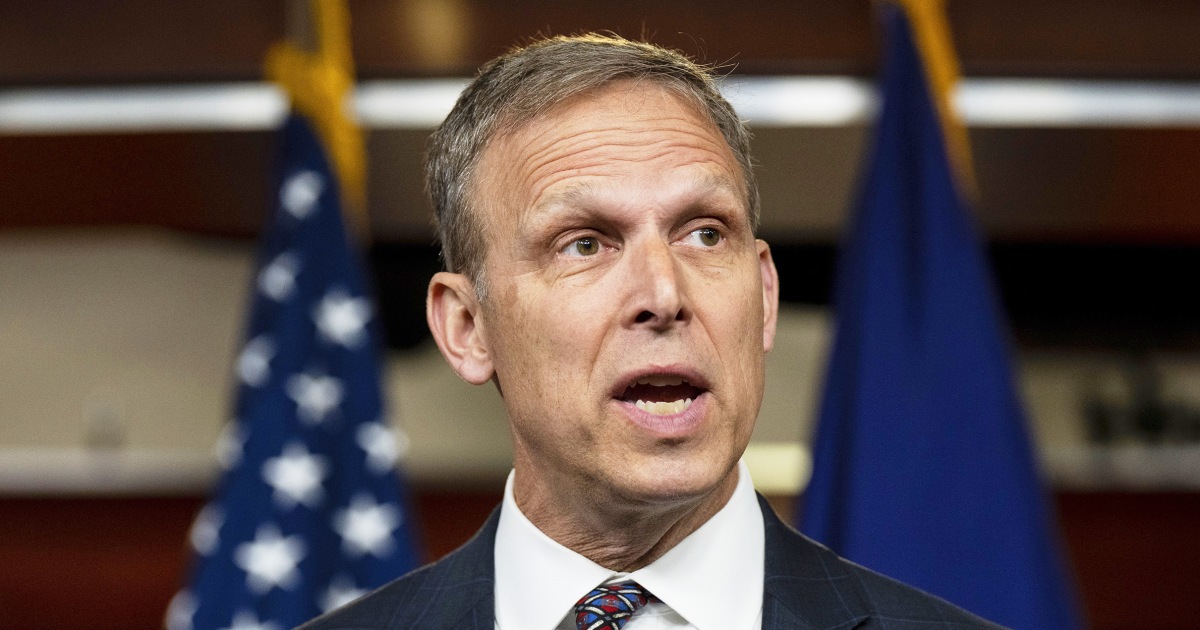Investigators from the Department of Justice reviewed numerous email exchanges between Rep. Scott Perry, R-Pa., Trump lawyer John Eastman and two DOJ officials who were pushing the then-president’s plan to overturn the 2020 election results, newly unsealed court filings show.
On Friday, the chief judge of D.C. federal court revealed she had approved a government request for investigators to obtain exchanges between Perry and Eastman and other exchanges between Perry and now-former Justice Department officials Jeffrey Clark and Ken Klukowski.
All four men have loomed large in hearings before the House committee investigating the Jan. 6 riot. Earlier this year, federal investigators seized phones belonging to Perry and Eastman and also searched Clark’s home.
The unsealing of the documents by Chief Judge Beryl Howell was first reported by Politico.
The Justice Department had asked Howell to unseal a pair of decisions from June and September, but some parts are still redacted. The June ruling dealt with the Perry email exchanges, while the September decision involved a book outline investigators found on one of Clark’s devices recounting his efforts to combat the 2020 election results.
The communications between Perry and Eastman had to do with arranging a phone call, and the exchanges with Clark involved other people sharing news stories, the ruling said.
Cassidy Hutchinson, a former aide to Trump White House chief of staff Mark Meadows, testified before the House committee in June that Perry had been pushing for Clark to become acting attorney general in the wake of the 2020 election. “He wanted Mr. Clark — Mr. Jeff Clark to take over the Department of Justice,” Hutchinson said.
The emails with Klukowski included a Nov. 11, 2020, message where he sent Perry a document titled “Electors Clause/The Legislature option” that argued “in support of the proposition that ‘The Constitution makes state legislatures the final authority on presidential elections.'” The author of the document was not identified, Howell noted.
In another exchange that year, on Christmas Eve, Klukowski sent Perry a document titled “State Legislatures Can Self-Convene to Appoint Presidential Electors.” That document also did not name an author.
In releasing the communications, Howell agreed with the government filter team, which reviewed the more than 130,000 emails obtained by a search warrant, that attorney-client privilege did not apply in Klukowski’s case because he “was still employed in the federal government and therefore Congressman Perry could not have been his client.”
It’s unclear why the Justice Department asked the judge to unseal the rulings now.
In the September ruling, Howell allowed the filter team to pass on an autobiography outline found on one of Clark’s devices.
Six of the chapters “outline his perspective on the 2020 presidential election results (“[D]on’t believe it but I’ve got a day job”) and role in the election’s aftermath, including his description of the ultimately never-sent ‘letter to Georgia legislature’ regarding potential election fraud and Trump’s reaction to it (‘good letter’).”
It also gives Clark’s account of the contentious Jan. 3 meeting with Trump, then-Acting Attorney General Jeffrey Rosen and others where the president nearly replaced Rosen with Clark, who had been urging the Justice Department to be more aggressive with claims of election fraud.
Clark didn’t help his bid to keep it under wraps — he noted in the subject line of the outline that “[n]one of this outline is privileged information.” He later added, “However this is attorney work product,” a conclusion the judge disagreed with.
Howell also disagreed with Clark’s argument that he’d prepared the outline as part of a litigation strategy.
“The outline’s conclusion does not contain thoughts or legal strategies related to the congressional committee investigations, but rather a promise to ‘resist communism’ and work on ‘Covid litigation and against wokeism,” Howell noted.
In a statement Friday, Eastman lawyers Charles Burnham and Harvey Silverglate said, “We have written a letter to Special Counsel (Jack Smith) protesting what’s been done, and we’ve copied the Attorney General. We hope someday to make public the correspondence that results from this matter.”
Smith was tapped last month by Attorney General Merrick Garland to oversee the Justice Department’s investigation of the Jan. 6 riot and the criminal probe of Trump’s possible mishandling of classified documents.
Burnham, who’s also representing Clark, said in a separate statement on Clark’s behalf that “It is incumbent on those at the Department who sought this unsealing to explain why doing so is anything other than a calculated move to increase pressure on those being scrutinized as part of the investigation and to prejudice a possible future jury pool.”
A spokesperson for Perry did not immediately respond to a request for comment Friday. Ed Greim, a lawyer for Klukowski, declined comment.
Share your story or advertise with us: Whatsapp: +2347068606071 Email: info@newspotng.com











